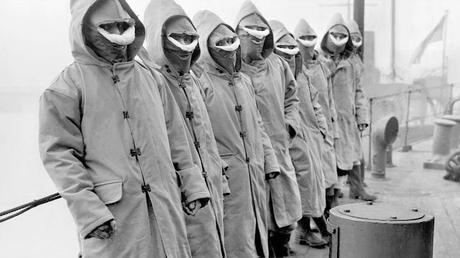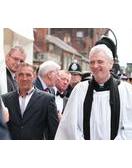
I read in Voices from the Arctic Convoys, by Peter Brown, the testimony of Austin Byrne. He tells the story of Anderson, a 17-year-old American cabin boy.
He was on the Induna, a British steam merchant ship, in convoy PQ-13, which set off from Reykjavik for Murmansk on the 20 March 1942. The ship lost contact with the convoy because of bad weather and was torpedoed on the 30 March 1942. For four days the 41 survivors were in two lifeboats in temperatures of around 20 below and freezing winds. When they were picked up by a Russian minesweeper only 30 of them had survived.
Byrne writes, "I was on the bridge [of the Russian minesweeper] when I was called by one of the Russian crew, a lady. She was having difficulty with the cabin boy, [...] Anderson. She could not lay him down; he was frozen bent, and I helped her to get his jacket off. I cut it up the back. He was black to way up above the waist, and when she saw this she told me to leave him. .. I saw her eyes ..., and they were damp, and full of sadness and pity, for I think that she knew he had very little chance. That was the last I saw of him. .. I was woken to be told that [he] had died"
Byrne writes of another man, 'The Canadian', Russell Harrison Bennet. He had already been rescued by the Induna from one ship after he had been badly lacerated and burned when it exploded, and now, following the torpedoing of the Induna, spent four days in the lifeboat before being rescued by the Russian minesweeper, where he died of his horrific wounds. Byrne writes of him, "How he suffered no one will ever know, but he never moaned. He was a truly wonderful man, one who it was a privilege to have known, and to be able to speak about. He is now in the keeping of the Russian people. Please say a prayer for him. I do every day."
The conditions on the Arctic convoys were appalling, hellish. Churchill called it the world's worst journey.
Another woman writes of her father: "To my knowledge, he went on the Arctic Convoy journey at least five times. He would break down in tears frequently if he tried to tell us very much as to what happened during those terrible years. I do know that their ships were covered feet deep in ice, and that the conditions were so dreadful that they worked and slept in their duffle coats. That was all they had and it was the only way they could try to keep warm. Rum became a favourite tipple and probably helped to keep them sane!"
What is it all about?
In 2009, two days before Christmas, I took the funeral service of Lance Corporal Adam Drane. He was the 100th British soldier killed in Afghanistan. He left behind his girlfriend and his parents. His only brother was seriously mentally disabled, and Adam's death broke his parents.
Today it seems that Adam's sacrifice, and the sacrifice of countless others in Afghanistan, was pointless.
What is it all about?
History has a way of making fools of us.
We remember today the Arctic convoys 80 years on. They are a critical part of the story of the defeat of Nazism, and also an example of how Americans, Canadians, British and Russians could work together.
Maybe I am too much of a sceptic, but I doubt that in 80 years' time we will be remembering the 20 years that US, British and other forces spent in Afghanistan.
But does that make it any less worthy or any less significant?
And irrespective of what we think about the political decisions that led to war, what about the lives of people like Anderson and Adam?
Was Anderson's sacrifice justified and Adam's sacrifice futile?
They were both young men who signed up - for whatever reason - and who died serving in a war in a faraway place that their countries, through their political leaders, had thought needed fighting.
Maybe the things that really matter are not the big things, but the little things.
Maybe the thing that will ultimately be shown to matter is not the campaign in Afghanistan, not even the Arctic Convoys, significant as they were in the defeat of Hitler and the liberating of Russia, but the little things - the good things that were done, the right things that were done, and the individual sacrifices - things that were done then and there.
Maybe, in the final history of the world - and as a follower of the crucified and risen Lord Jesus I believe that a final definitive history of the world will be revealed - the things that will matter will be the young man or young woman who signs up, not simply because they want an adventure and to see the world, but because they want to defend the weak and the vulnerable and the crushed.
Maybe they are naively idealistic, but so what? If that idealism is abused then, in my understanding of history, it will be the people who abuse it who are held to account.
Or again, maybe what matters is the person who refuses to serve or who protests because they believe in something that is good and right, even if it means that they are mocked or sent to prison,
Maybe what matters is the soldier who just by turning up protected the home of an Afghan family, there and then, or who showed an Afghan young girl that she had a dignity and gave her the dream of a future equal to that of a man, or the Afghan man who cared for the wounded British soldier.
And maybe the thing that really mattered was the packet of cigarettes exchanged for the Russian badge of the Red Star and Sickle, the friendships built up between the allies and the 'damp eyes, full of sadness and pity' of the Russian crew member, who wept for a young foreigner she would never have time to know.
Maybe what really matters is kindness (we need that so much in our political and social discourse today) and comradeship and gentleness and humanity and courage and generousity and the ability to break down barriers, to listen and to forgive.
Our readings ( Matthew 13:31-33) today speak of how the Kingdom of God will grow from tiny seeds sown in the earth.
It will grow from a sprig taken from a cedar tree, planted on the top of a mountain.
It will grow from a mustard seed.
The Kingdom of God begins with the tiny seed of a man 2000 years ago, who chose to go to the cross, to be crucified and buried, because he loved God and he loved us and because it was the right thing to do.
This year we've established a gardening team. The front garden looks better than I have seen it in 4 years. But the real work that they have done has not been seen. Because they've done a lot of planting. And for that we need to wait.
And although of course we want to be big and important and be on the winning side and do the sort of stuff that our history will remember, because we think that in that we find our significance, I pray that in the end we will discover that, because of that man, in God's eyes we already are beloved and have a significance - if we would trust him and receive it - and that what really matters are the seeds that we plant, literally and metaphorically, and the little things that we do today where we are.
CS Lewis writes, "Good and evil both increase at compound interest. That is why the little decisions you and I make every day are of such infinite importance. The smallest good act today is the capture of a strategic point from which, a few months later, you may be able to go on to victories you never dreamed of. An apparently trivial indulgence in lust or anger today is the loss of a ridge or railway line or bridgehead from which the enemy may launch an attack otherwise impossible."
The seeds that we sow today are the good thing and the right thing that we do, even if they are very little things. It is about how we treat our staff or our customers, or those closest to us. It is about how we treat those who we disagree with. It is about memorial here and now, how we remember, and who and what we honour. It is about a British officer and a Russian officer standing side by side at a memorial in Murmansk. It is about the little sacrifices that we make each day for what is good and right and true. It is about our friendships: the most diplomatic thing that we can do is to make friends with those who are different from us.
I got to know a tiny bit about Adam, and of course Anderson was just a 17-year-old boy that I have read of. But I do know this.
That irrespective of what history says of them, irrespective of the worthiness or the success of the cause for which they died, they matter - and they still matter - just as every person matters.
And that will be their true story.

